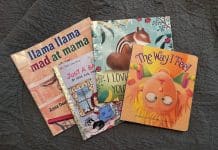
This morning, my kiddos said goodbye and left with my husband for a week to visit his sister in New York. I know that’s not interesting or exciting (The excitement of having the house to myself for a week is diminished slightly because I had to miss joining this trip because of work. But only slightly!) What IS exciting to me is that Libby, my youngest, left my side without having a complete meltdown. There was a sad-faced hug. And another. And a third. And a fourth that morphed into a group hug. But the fact that she didn’t scream and cry and refuse to let go of me is a victory years in the making. Her separation anxiety has been a force to reckon with.
There was a time when EVERY goodbye was traumatic for her and, to be honest, for me, too. It took some effort for us to learn how to say goodbye nicely.
So, if your kiddos lose it every time you walk out the door without them, I thought I’d share our tips for finally parting company with fewer tears.
Remember this is Perfectly Normal
Separation anxiety is a normal part of childhood development. It may happen when your kids are toddlers and then again when they’re in preschool. It makes perfect sense if you think about it; your kid depends on you for survival. When you see the person responsible for keeping you fed and sheltered leaving, of course, you’re going to start to feel a little nervous. Both of my daughters experienced some separation anxiety, but it was my youngest daughter who seemed particularly anxious.
To reassure Libby that I wasn’t leaving her forever, when Libby was little, we had a saying we used. I’d start by saying, “When Mama goes away…” and Libby would have to answer “… she comes back.” We said it a 100 times a week, always pointing out the truth of it when I returned- and eventually, the refrain started to stick.
We also pretty quickly determined that my husband had an easier time doing the morning drop offs than I did, so we shifted our schedule so he was the primary person doing day care drop-offs. When for some reason I did have to leave them in the morning, I learned to give myself more time than I thought I’d need.
Finally, as tempting as it might be to sneak off, especially if you have a 9 o’clock meeting, try not to leave without saying goodbye. Learning to say goodbye is something we need to teach our kids just like everything else. Sneaking out the door once she was distracted instead of saying goodbye was certainly easier to do, but I found it only heightened her separation anxiety the next time I had to go somewhere.
Create a Goodbye Routine
Our awesome daycare helped us a lot with easing the transition from home to school each day. Without either of us even realizing it, they set us up with a goodbye routine. All the little things we would do each day- from helping our kiddos hang their coats up to, to putting lunches in the fridge, to looking at the day’s schedule posted in the classroom became part of easing the anxiety of separation.
Ultimately, the final moment before I left without Libby was still tough though. Libby’s teachers would turn this into a game at the window. When she was very little, they’d hold her up to the window in the door for me to play a quick game of peek-a-boo before announcing cheerfully, “Last one!” This was my cue to wave and exit. When she was older, we’d play a game where we’d race each other to the window for a final goodbye. I’d race outside and Libby would race inside to see who got there first for the final wave. These little games allowed me to physically separate, an all important first step for being able to walk out the door and mentally separate at each part of the routine.
Ask Your Child to Help You Say Goodbye
Despite all our efforts to reassure Libby and to develop routines and rituals for saying goodbye, she often remained anxious whenever I had to leave the house without her. Mornings were agonizing as I tried to get dressed and out the door. She’d cling to me and wail as if her heart was breaking. It got so bad, I couldn’t wear skirts or dresses anymore because she associated them with me leaving and would start to freak out even on days I wasn’t working.
After one particularly painful morning where Libby literally chased my car down the street, I was at my wit’s end.
That night when I crawled in bed next to her to cuddle before bed, desperate for a change, I had the following conversation with Libby:
ME: This morning was hard. It was very hard for me to go to work because you were so upset.
LIBBY: I don’t like it when you go to work.
ME: But I have to go to work because I have a job that needs me. What can we do to make our goodbyes better in the morning?
LIBBY: You can give me a hug, a toy, and a kiss.
ME: A hug, a toy, and a kiss? That’s what you want in the morning before I leave?
LIBBY: Yes.
Well, okay then. As simple as can be, Libby herself came up with something that would help her say goodbye in the mornings. I, of course, initially panicked at a number of toys this was going to cost me. More stuff? Would it be worth it…?!

After that first morning though, I realized that Libby didn’t actually require a NEW toy from me. Instead, every morning when it was time for me to head out the door, I selected a different plastic figurine from our jar on the shelf. “Hug, toy, kiss!” I’d announce and Libby would meet me in the mudroom for our exchange. I’d often tell her why I picked out a particular animal, “This parrot wants to squawk in your ear today, ‘I love you!’” Or, “This dog needed an extra cuddle today in your pocket.” Whatever it was, something about this routine that she developed herself did the trick.
Most days, that is. There were times that we’d have weeks of warm, sweet goodbyes together followed by three or four days of total morning meltdowns. My husband would snarl at me, holding a weeping Libby at the door, “Just go!” And I would leave the house, shutting the door on her inconsolable weeping, my heart heavy. I even raised quitting my job at one point because surely this wasn’t good for her and it was killing me. But I kept working, and we kept trying to find ways to say goodbye together. Which leads me to my final tip…
Let Them Get Older
There are times when we want to freeze them right where they’re at and never let them get any older, right? Having survived years of Libby’s morning conniption fits, I was more than ready for her to grow up. At least a little bit. I think Libby was in kindergarten when her morning tantrums at my leaving finally eased.
She got older, more independent, and finally understood that saying goodbye is a part of life.
Notice I’m not saying that her morning tantrums stopped completely. I think some kids are just more anxious than others, and there are still some mornings when Libby just can’t stand saying goodbye. She doesn’t say this now, of course, as I’m walking out the door. Instead, as the time approaches for me to leave, she throws a fit over the dress she’s wearing, or the toothpaste I offer her to use, or the bed we ask her to make, or the very existence of her big sister in the room with her.
When this happens, I’ve learned to take a deep breath and let her cry, even when every fiber of my being is trying to get out the door on time! I get down on her level and try to name the feeling she’s having and tell her it’s ok to be mad or sad. We sit together for a few minutes until she’s ready to move on. The times I try to ignore her or distract her, or fuss at her to stop, typically result in an even bigger blow-up. More tears, more stomping, more anger and frustration on all of our parts.
I also try to take an extra five minutes to hold her in my bed when she first wakes up now in an effort to make the mornings go more smoothly. Libby seems to need these quiet moments of connection with me at the day’s beginning. Her sister, by contrast, is content with a good morning peck and an extra filling of her cereal bowl as I head out the door. Nell seeks connections at other times in other ways, happily waving goodbye as I head off for work. It’s Libby who rebels against our parting.
Why is she this way? I can’t say. All I know is that with time and effort, we’ve learned to bid each other farewell in the morning more gently, and, as a result, these simple goodbyes are all the sweeter.








